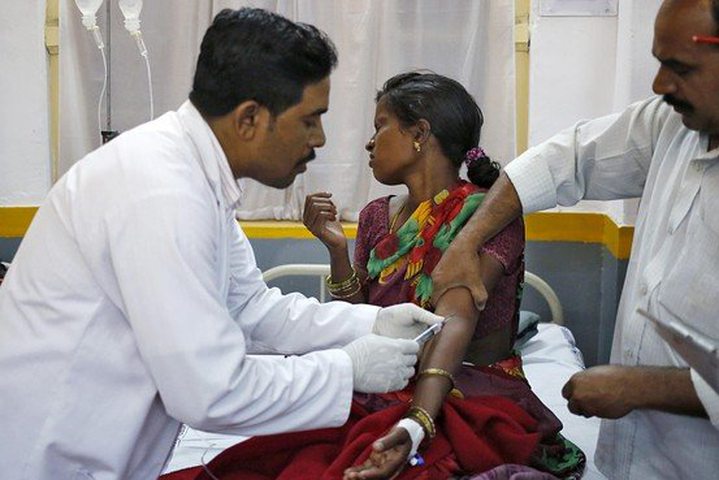Deaths Put Spotlight on India’s Sterilization ‘Camps’

A hospital staff member at Chhattisgarh Institute of Medical Sciences hospital in Bilaspur, India
When Janaki Suryavanshi asked local health workers about birth control, she was told her only choice was surgical sterilization—the same method used by her mother and neighbors in this village.
Assured it was safe, the 26-year-old mother of three signed up to undergo the procedure, which was performed by a single surgical team on Saturday Nov. 8 on her and 82 other women at a government-sponsored population-control “camp” in the central Indian state of Chhattisgarh.
Ms. Suryavanshi and 11 other women died in the aftermath. A 13th woman died after undergoing sterilization surgery on Monday at a nearby clinic as part of the same campaign.
State authorities say they are investigating what killed them and sickened dozens of others. Among the possibilities they are probing: improperly sterilized surgical instruments or adulterated medicines.
Health activists say the real culprit is the Indian government’s focus on female surgical sterilization as a cornerstone of the nation’s family-planning program.
“We only know the world of sterilization,” said Ms. Suryavanshi’s mother, Anjora, standing in her one-room home in Chichirda, a village of 2,600 in the state of Chhattisgarh. If any other birth control had been available, she said, the family wouldn’t have opted for surgery. In a recent government survey, 34% of households nationwide said female sterilization was their current method of family planning.
On Wednesday, police detained the doctor who performed Saturday’s surgeries, R.K. Gupta, on suspicion of having committed culpable homicide. He was in custody but hadn’t been charged and couldn’t be reached to comment by The Wall Street Journal.
In an interview with Reuters, Dr. Gupta said he was wrongly being made a “scapegoat” and said he suspected the women died because of what he described as adulterated medicines given after surgery.
The state suspended the sale of five brands of drugs as well as cotton wool used in connection with the Nov. 8 operations while tests are conducted to determine if they contributed to the deaths, a state spokesman said.
The medicines include Indian-made brands of ciprofloxacin, a commonly used antibiotic, and ibuprofen, a painkiller, as well as the anesthetic lignocaine.
India’s government, seeking to curb population growth in the country of 1.2 billion, offers cash incentives to women, physicians and health workers participating in the surgeries. Around 4.5 million women were sterilized in the year ended March 31, 2013.
Activists criticize these payments to promote sterilization. But women in this part of Chhattisgarh said that what led them to be sterilized over the past few days was the lack of practical alternatives.
Her parents say Ms. Suryavanshi was struggling to raise her three children, age 7, 3 and 1, with the money her husband earned—about 50 rupees (around 80 cents) on the days he could find work.
When Ms. Suryavanshi arrived at the hospital, she and 82 other women were lined up on sheets on the floor in an operating room. Within three hours, all the operations were done, said her mother.
“Some people said, ‘How could it be done so fast?’ but the doctor just said, ‘It’s done, it’s done, go home,’ ” the elder Ms. Suryavanshi said.
The government’s manual on sterilizations says surgical teams should do a maximum of 30 procedures a day with three laparoscopes, and not more than 50, regardless of the number of instruments. It is considered minimally invasive surgery and entails tying the fallopian tubes.
When more women than expected show up—in part due to the motivational campaigns of local health workers—doctors often ignore the limit, said Ramanesh Murthy, medical superintendent of the Chhattisgarh Institute of Medical Sciences.health
After her procedure, Ms. Suryavanshi’s health deteriorated. Her parents said she felt dizzy and vomited up the only meal she was able to eat on Sunday morning.
Her parents called an ambulance at 5 a.m. Monday to take her to the district hospital in the nearby city of Bilaspur. She died two hours after she was admitted. The parents said their daughter’s doctor didn’t tell them the cause of death.
On Thursday, the Chhattisgarh Institute of Medical Sciences and other area hospitals were treating dozens of other women suffering postoperative complications after Saturday’s procedures.
Women sterilized on Monday in several camps were also being hospitalized. India’s state governments periodically schedule opportunities for mass sterilization at established hospitals and medical centers that are referred to as “camps.”
“We’re very scared,” said Maniram Surya, the husband of 26-year-old Dayamati Surya, who was sterilized on Monday and then complained of pain and began vomiting.
Ms. Surya had her first child at the age of 16, and now has three, her family said. Mr. Surya said he earns 2,500 rupees, or $40, a month as a daily wage laborer.
“The health worker never told us about the risk,” Mr. Surya said, standing outside the hospital’s admission ward, holding the couple’s crying 2-year-old daughter.
Women at hospitals in Bilaspur who were sterilized in Monday’s camps said they had never used a condom, birth-control pills or intrauterine devices. The hospitalized women from Saturday’s procedure couldn’t be interviewed.
“What could I do?” asked Ms. Surya. “I didn’t know any other methods of contraception.”
The sterilization deaths should sound an alarm about the lack of birth control choices for women in India, said Poonam Muttreja, executive director of the Population Foundation of India, a New Delhi think tank. “It is inexplicable that this is the only option available to most women,” she said.
Local officials and doctors said the sterilized women had fevers and abdominal pain. One doctor said the cause of death appeared to be multiple organ failure. That can result from a severe infection that causes septic shock.
“There was a violation of operating procedures and sterile conditions in the camp,” based on preliminary investigations, said Sonmoni Borah, the divisional commissioner in Bilaspur.
A visit Thursday to the site of Saturday’s surgeries discovered a hospital with windows missing glass and floors covered with animal feces. The operating rooms were padlocked and couldn’t be entered.
The hospital had ceased regular operations in April, according to a caretaker, Bharat Lal Kaushik.
“The hospital was not frequently used,” said Amar Singh Thakur, a physician and the joint director of medical services in Bilaspur.
Police on Thursday visited the premises of two local pharmaceutical companies that had supplied some of the drugs for the sterilization program, said Mr. Borah.
In Chichirda, the Suryavanshi family received a government check of around 190,000 rupees, about $3,090, as compensation.
Ms. Suryavanshi’s mother said that they will use the funds to raise the children. Asked whether she’s planning to take any further action, she shook her head: “We’re poor people, no one’s going to listen to us.”





